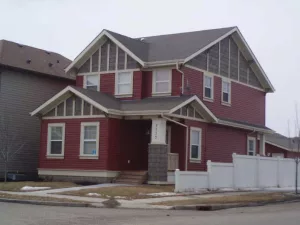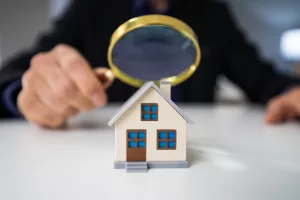You know that buying a home isn’t going to be free, but what you probably don’t know is what else you need to pay for when you buy a home. Here are some hidden closing costs of buying a home that you probably never considered, and may want to set some money aside for.
Disclaimer: All situations are different. If you want an exact cost, you will have to ask the people who provide these services. The amounts given are only estimates based on what fees may cost in Edmonton at the time of writing.

If you’re still weighing whether to buy at all, read Buying Vs. Renting a House: Which Is Right for You?
House Inspection ($700 to $900)
Professional home inspections are optional, but for what they cost, they could save you a lot more money down the road. Home inspections are often a condition on a real estate contract – so even if you decide not to buy the house in the end, you still have to pay.
Budget $400 to $600 for a house inspection, depending on size of the property or the complexity of the situation. If you decide to walk away from the purchase of a property that was inspected, that’s a sunk cost. But it’s better than finding out that a home requires thousands in repairs once you’ve already bought it. Of course, that means you’ll have to pay for another inspection on the next home you make an offer on.
Appraisal Fees ($500)
A bank or lender may charge you a fee for an appraisal of the property
A bank or lender may charge you a fee for an appraisal of the property. This may or may not be necessary depending on the house and the lender – apparently most lenders will waive this cost to get your business. To be sure, it’s best to ask your lender ahead of time, so you’ll be ready for any possible charges.
Survey ($900+)
Some homes need a new survey (also known as a real property report) because there has been a change made to the property. This gives the buyer information on changes to the property and whether they conform to municipal guidelines. The seller pays for the survey in most – but not all – cases. Although it’s less likely that a buyer will get stuck with this cost, keep it in mind as a possibility.
Legal Fees ($1,000+)
Typically, lawyers charge a flat fee to do the paperwork involved in transferring ownership of a home from the seller to the buyer
You could do all the legal work on your house purchase, but I wouldn’t recommend it – unless you’re a lawyer. Typically, lawyers charge a flat fee to do the paperwork involved in transferring ownership of a home from the seller to the buyer (known as conveyancing).
Because every jurisdiction is different, you can never know what the lawyer fees will be in your area unless you call a few lawyers. Fees may vary depending on many factors, but a portion of them is based on the value of the real estate transaction.
Disbursements ($400+)
Lawyers also arrange for other items to be completed when real estate is sold. These items are called disbursements, and there are fees attached to them. These include:
Land Titles Registration Fee: The Alberta Land Titles system needs some cash to change a title over from one person to the other. The lawyer makes all the arrangements and charges the fee back to the buyer
Courier Charges: Lawyers prefer to work with original copies of contracts and documents, so there’s actual physical courier charges involved in delivering them.
Photocopying: Everyone needs a copy of everything so that they’re all on the same page.
Printing: Paper and toner aren’t free.
Again, these items vary, mostly depending on the price of the property you’re buying.
Fire Insurance ($200 per year +)
You cannot have a mortgage without fire insurance. That’s because the house isn’t just yours – it’s the lender’s, too. The lawyer will likely arrange for this also, because without it, money can’t be transferred from lender to lender.
If you buy a house with cash (no mortgage), then you don’t need to have fire insurance, but going without is still a bad idea. A big fire can mean losing everything. This is one risk that just isn’t worth taking.
Fire insurance is based on the value of the house. The more the house costs to replace in case of a loss, the more the premium has to be.
Tax Adjustment (Varies)
There is always a property tax adjustment when you buy a home. There are two ways this can work: The taxes could already have been paid by the seller, or they could still be owing. If the taxes were paid by the seller, the buyer will have to pay the seller back for all the months the seller won’t be in the house in that year. If the taxes are not paid, the lawyer will pay the taxes out of the seller’s proceeds of the sale for the amount of time the seller will be in the home.
Services Hook-up Fees ($10 to $130)
Utilities, such as power, heat, Internet, phone and cable, sometimes require a hook-up fee. Sometimes companies won’t charge for the hook-up, or they’ll include it, but you should call your provider and find out just to be sure.
Budget for anywhere from $10 to $130 per service depending on whether you need to transfer the utility from your previous home and have given ample notice or you need an emergency hook-up done because everything has been disconnected.
Moving Costs and Storage ($50 to $1,000+)
Not everyone is able to do all their own moving, which can mean shelling out for a truck or professional movers. If you plan on moving your items in stages – for example storing some items while you sell your home – you may need to pay someone to store your stuff for a while.
Moving costs vary from place to place and company to company depending on what you need and what they offer. Of course, if you’re moving from city to city or province to province, the costs will be higher as well.
Budget anywhere from $20 a day plus mileage for a simple pick-up truck, all the way up to thousands for professional movers to take your stuff from one province to another. It really depends on the situation.
GST
The Canadian Revenue Agency charges GST on new home sales, so if you’re buying a brand-new house that has never been occupied, make sure the contract says it is included – it usually is. There is no GST charged on resale homes. Also note that there is a rebate available from the Government of Canada that you can apply for, although some builders require the buyer to sign it over to them when a purchase contract is made – and it’s probably not worth anything to you at all but a great deal to them. Talk to your accountant to find out what you might be able to write off or get a credit or rebate for if there are any taxes on your purchase.
Being Prepared for the Costs of Buying a Home
If you’ve made it this far, the hidden costs of buying a home are no longer such a mystery. So how much money do you need for all this stuff? A couple thousand dollars is a pretty safe bet. And if you have some money saved up for these items in advance, it’ll make everything a bit easier. There is a lot of money involved in buying a home in the first place, but all these extras are extremely important, too. If you don’t have the money for all the extra fees associated with a real estate purchase, you may need to use borrowed funds. Either way, you should at least know what you’re in for, and avoid any unpleasant financial surprises.

